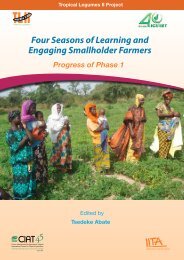Four Seasons of Learning and Engaging Smallholder Farmers - icrisat
Four Seasons of Learning and Engaging Smallholder Farmers - icrisat
Four Seasons of Learning and Engaging Smallholder Farmers - icrisat
Create successful ePaper yourself
Turn your PDF publications into a flip-book with our unique Google optimized e-Paper software.
Lessons learned<br />
• The individual farmers are <strong>of</strong>ten reluctant to become seed growers due to lack <strong>of</strong> capabilities for seed<br />
processing <strong>and</strong> storage <strong>and</strong> difficulties in marketing. Community Seed Producer Associations may<br />
be promoted which will have better access to seed processing <strong>and</strong> storage facilities <strong>and</strong> marketing;<br />
• Pigeonpea is a <strong>of</strong>ten cross pollinated crop because <strong>of</strong> insect(honey bees) pollination <strong>and</strong> finding<br />
appropriate isolation distance (500 m) for seed production has proved to be most difficult task.<br />
This situation further aggravated by stray <strong>and</strong> self sown pigeonpea plants, pigeonpea growing in<br />
backyards, homesteads, <strong>and</strong> social factors;<br />
• Seasonal fluctuations in the preference for pigeonpea crop among the farmers <strong>and</strong> there by<br />
inconsistent seed dem<strong>and</strong> over years;<br />
• <strong>Farmers</strong>’ awareness on improved varieties <strong>and</strong> seed availability <strong>of</strong> improved varieties are the key<br />
factors in spread <strong>of</strong> improved pigeonpea varieties;<br />
• Conduct <strong>of</strong> PVS, field days <strong>and</strong> seed fairs are very effective in awareness creation among farmers<br />
about new varieties <strong>and</strong> generate sustained seed dem<strong>and</strong>;<br />
• Lack <strong>of</strong> proper cleaning, grading <strong>and</strong> storage facilities hampers seed production by individual<br />
farmers;<br />
• The farmers were very keen to take up seed production provided arrangement was made for assured<br />
procurement <strong>of</strong> seed;<br />
• Sustainable seed production by smallholders st<strong>and</strong>s a better chance <strong>of</strong> success if complimented by<br />
functional seed <strong>and</strong> product markets;<br />
• Project interventions should focus on pro-poor seed production <strong>and</strong> delivery systems that have a<br />
better chance <strong>of</strong> surviving beyond the lifespan <strong>of</strong> the project;<br />
• Need for faster varietal testing <strong>and</strong> release systems in ESA to enhance the spectrum <strong>of</strong> varieties<br />
available to farmers;<br />
• Business-oriented small holder farmers perform better in seed production, storage, <strong>and</strong> dissemination<br />
than food security-oriented farmers, hence these group <strong>of</strong> farmers should be involved in seed<br />
systems;<br />
• Limited number <strong>of</strong> research <strong>and</strong> seed technicians available in ESA also hampers progress <strong>of</strong> seed<br />
dissemination;<br />
• Efficient linkages between formal <strong>and</strong> informal seed systems are critical success factors;<br />
• Seed production under assured growing conditions to harvest assured seed; <strong>and</strong><br />
• Knowledge empowerment <strong>of</strong> progressive farmers so that they can take up seed production.<br />
Vision for second phase<br />
• The activities will be exp<strong>and</strong>ed to new districts within the existing zones/regions in Tanzania <strong>and</strong><br />
Malawi. In Ug<strong>and</strong>a, as a new country in phase 2 project activities will be carried out in Kitgum <strong>and</strong><br />
Lira districts <strong>of</strong> Northern Ug<strong>and</strong>a;<br />
• Establishing functional legume value-chains to stimulate seed dem<strong>and</strong>;<br />
• Seed production manuals published, awareness created through PVS, new varietal releases – fosters<br />
better seed systems in second phase;<br />
• Strengthening linkages between researchers, seed producers, agro-dealers, private large scale<br />
entrepreneurs;<br />
Progress <strong>of</strong> Phase 1<br />
215

















